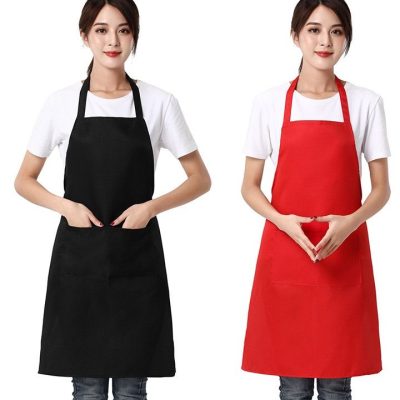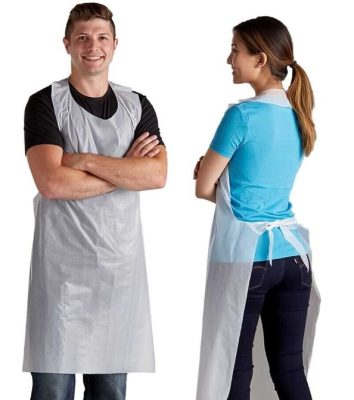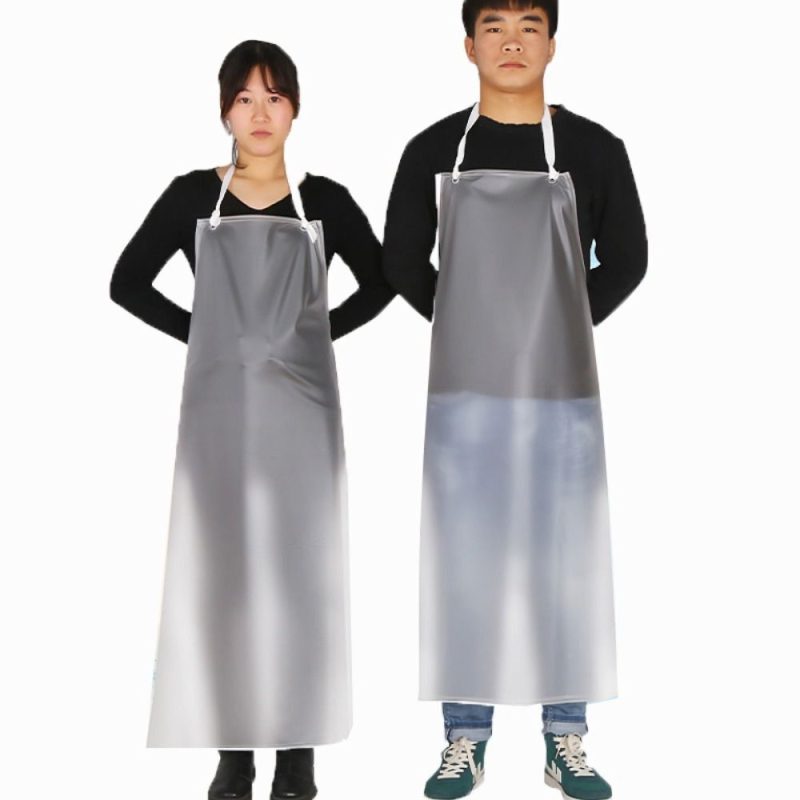Aprons are one of the most basic and widely used protective equipment across various industries, including healthcare, food processing, garment manufacturing, restaurant chains, and handicrafts. They not only protect users from harmful agents such as grease, chemicals, and dust but also help maintain cleanliness in the workplace. This is especially important in environments that require strict safety and hygiene standards, such as hospitals and food processing plants.
Additionally, aprons serve as uniforms to enhance professionalism and brand recognition. With diverse designs and added convenience features such as pockets, aprons offer comfort, increasing work efficiency and ensuring high-quality performance. Thus, aprons are not just accessories but essential tools across many professions.
Currently, the two most common types of aprons on the market are Disposable Aprons and Reusable Aprons. Each has its own advantages and disadvantages. So, which is the best choice for consumers?


Comparison of Disposable Apron and Reusable Apron
Materials and textures of Disposable Apron and Reusable Apron
- Disposable Apron: Made from PE, PP, or PVC plastic. It has a simple, lightweight, waterproof design with thin straps and usually no pockets.
- Reusable Apron: Made from cotton, polyester, or blended fabrics. It is thicker, breathable, and features adjustable straps to fit different body shapes. It can be washed and reused multiple times.
Durability and Usage Time
- Disposable Apron: Due to its thin design, it has low durability and tears easily under strong force. It is meant for single use, making it suitable for short-term work and preventing cross-contamination.
- Reusable Apron: With a thicker structure, it is more durable. When properly maintained, it can last for months or even years. It is ideal for jobs that require long-term durability.
Protection and Hygiene
- Disposable Apron: Provides maximum hygiene as it is discarded after one use, reducing the risk of cross-contamination. Made from plastic, it offers excellent resistance to water, grease, and harmful chemicals.
- Reusable Apron: If not cleaned properly, it can accumulate dirt, grease, and bacteria, posing hygiene risks. It is not ideal for environments requiring high waterproofing, as it offers less protection against moisture and chemicals compared to disposable aprons.
Convenience and Flexibility
- Disposable Apron: No need for washing or maintenance; simply use and dispose of. Its lightweight design makes it easy to carry and replace.
- Reusable Apron: Made from soft, breathable fabric, ensuring comfort for long wear. It often includes pockets and adjustable straps, making it practical for carrying tools and accommodating different body types. Additionally, reusable aprons can be customized with logos and colors, enhancing aesthetics and brand identity.
Cost and Economic Benefits
- Disposable Apron: Low initial cost due to its cheap price, especially when bought in bulk. However, continuous purchases over time can become expensive. Additionally, businesses with strict environmental policies may face high waste disposal costs due to the non-biodegradable nature of plastic materials.
- Reusable Apron: Higher initial investment but more cost-effective in the long run due to its reusability. With proper maintenance, it can last for months or years, saving costs compared to frequently purchasing disposable aprons. While there are maintenance costs such as washing and drying, these are minimal compared to the expenses of frequent replacements.
Environmental Impact
- Disposable Apron: Generates significant waste as it is discarded after one use. The plastic materials used (PE, PP, PVC) take a long time to decompose, impacting the environment. However, some businesses are shifting towards biodegradable materials to reduce environmental harm.
- Example: In Vietnam, the Vietnam Textile and Apparel Association (VITAS) has also emphasized the importance of increasing the use of recycled materials for personal protective equipment (PPE) products to meet the urgent market demand for environmentally friendly solutions. This is also a green and sustainable manufacturing trend that many global PPE manufacturers are striving towards
- Reusable Apron: More eco-friendly as it reduces waste by eliminating the need for frequent replacements. It contributes to environmental protection by minimizing plastic waste.
In addition to the points above, you can learn more about the advantages of Disposable Aprons here.
Which One Should You Choose?
Both types of aprons have their own strengths and weaknesses, so the best choice depends on the nature of the work and user requirements.
Choose Disposable Apron if:
- You work in an environment with strict hygiene and safety standards, such as healthcare, food processing, or cleanroom settings.
- You need a quick and temporary solution without the hassle of washing.
- You require a large quantity of aprons for short-term use at a low initial cost.
Choose Reusable Apron if:
- You want to save costs in the long run rather than making frequent purchases.
- You care about environmental impact and prefer sustainable, eco-friendly materials.
- Your work requires comfort, professionalism, and brand recognition, such as restaurant staff, café baristas, bakers, potters, artists, or craftsmen.
Conclusion
There is no universally perfect apron—only the most suitable one based on your needs. Disposable Aprons offer convenience, waterproofing, high hygiene standards, and affordability in the short term. However, they incur high long-term costs and contribute to plastic waste.
In contrast, Reusable Aprons are durable, cost-effective over time, environmentally friendly, and enhance professionalism but require regular washing and maintenance.
Choosing the right apron depends on your specific needs and industry requirements. Disposable Aprons are ideal for environments that demand absolute hygiene, while Reusable Aprons are a sustainable and economical choice for long-term use.
In some cases, combining both types may be the best solution to balance cost, hygiene, and work efficiency.
Whether you prioritize convenience and hygiene or long-term sustainability and cost savings, selecting the right apron will optimize work efficiency and enhance professionalism. For consultation and to choose the right apron for your needs, contact TM&DV 8688 COMPANY LIMITED today!
Frequently Asked Questions
Which Apron Should Hair Salon or Spa Employees Use?
In the beauty industry, including hair salons, spas, and aesthetic clinics, both Disposable Aprons and Reusable Aprons are used. However, the popularity of each type depends on the nature of the work and the hygiene requirements of each service.
Use of Reusable Aprons
- Cost-effective for daily operations: Hair salons and spas usually have a fixed team of employees working daily, making Reusable Aprons a more economical option compared to purchasing new aprons every day.
- Professional and stylish design: Reusable Aprons come in a variety of designs, enhancing professionalism and aligning with the upscale image of premium salons and spas.
- Convenient pockets: Salon staff often need to carry tools such as combs, scissors, hair clips, and dryers. Reusable Aprons with pockets provide great convenience.
- High durability: These aprons are resistant to hair styling chemicals, dyes, and massage oils, preventing them from tearing or degrading quickly.
Use of Disposable Aprons
- Strict hygiene requirements: In high-end spas or aesthetic clinics offering treatments such as microneedling, filler injections, and cosmetic tattooing, staff must maintain absolute hygiene. In such cases, Disposable Aprons help prevent cross-contamination.
- Hair coloring and bleaching services: Some salons use thin Disposable Aprons for bleaching or light hair coloring to prevent dye stains on uniforms and to protect employees from prolonged exposure to harmful chemicals. As hair dyes and bleaches contain potentially hazardous substances, wearing Disposable Aprons is the best choice to ensure safety.
- Special customer treatments: Services involving a high amount of massage oils or skincare products should use Disposable Aprons to prevent staining employees’ clothing.
Hair salons, spas, and aesthetic clinics are typically high-traffic environments where beauty services are always in demand. During peak hours, customer flow is constant, making frequent apron washing necessary to maintain hygiene. However, with such a large number of customers, constant washing can be time-consuming and impractical.
In these cases, Disposable Aprons provide an optimal solution by saving time and ensuring convenience.
By combining both types of Aprons, businesses can optimize benefits, balancing cost-effectiveness, hygiene, and work efficiency. This strategic approach ensures cleanliness while maximizing convenience and professionalism.

